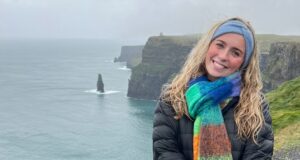By: Mark Fuery
Posted In: Sports

Photo credit: Salve Regina University
Time has just expired in the second period of Salve Regina’s Saturday night game against the nation’s 10th ranked team, the R.I.T. Tigers. The Seahawks find themselves down by a score of 5-0. Both of the teams are skating off the ice and heading towards the locker room after a hard fought 20 minutes of hockey. As the team heads in, Salve Regina’s first year head coach, Michael Cox, diverts his attention from the big game for a small amount of time. Cynthia, his wife, is there with their 10-month-old son Ethan to greet him as he comes off the ice. Cox picks up his son out of his carriage and holds him high for a few seconds before heading to the locker room to plan for the third period.
Michael Cox took over as head coach for the women’s ice hockey program at Salve Regina this past off-season. Although this is his first head coaching job, Cox came to Salve with plenty of experience in coaching women’s collegiate hockey. Cox was an assistant coach for a total of nine years with three different Division 1 programs, one of which he was a member of a National Championship team. Not only is Cox an accomplished coach, but he is also an accomplished family man. He spends most of his spare time at home caring for his 10-month-old son Ethan. “My leisure time is spent just trying to watch him.10-month-olds just like to crawl around and knock everything in the house over. Basically I spend half my day picking up after him,” Cox said. Cox grew up in what he described as “a modest home” in Shrewsbury, Mass. He shared a bedroom with his younger brother Kevin. He still remembers days where he would play pretty much any sport in the neighborhood with the local kids. He had cousins who lived down the street who would come over for dinner a few times each week, and in the summer Cox and his little brother would go to their cousins’ house to swim in their pool. When Cox was growing up, he was a big fan of the Boston Bruins because they were the local team and the Los Angeles Kings because of his favorite player, Wayne Gretzky. Cox and his cousins went to “Don Cherry’s Boston Bruins Hockey Camp.” “This would be back when the players would actually coach and they would be there all week. It was like the greatest thing,” Cox said. “Gerry Cheevers taught me how to play goal.” Cox attended Shrewsbury High School, where he played goaltender for the hockey team. During his senior year, when he was the varsity captain, he played on the same ice as his younger brother Kevin for the first and only time. “He was on the JV team and I was the captain of the varsity team. We had about three days playing in tryouts. It was the only time my brother and I ever skated on the same ice,” Cox said. After graduating from Shrewsbury High School in 1988, Cox played a year of junior hockey for the now defunct South Shore Braves. He then moved on to Merrimack College where he majored in English. While he was in college, he played goaltender for the hockey team until he graduated in 1993. When he graduated from college, Cox started working as a journalist. His first job in the field was for the Catholic Free Press, which he worked with for four years. While he was there he covered prominent Catholic figures such as Pope John Paul II and Mother Teresa. After his time with the Catholic Free Press, Cox went on to work for a newspaper called “The Pilot”. The Pilot was the newspaper for the Archdiocese of Boston. While working here he covered various events within the Catholic Church in the Boston area. Cox later moved on to work for a company called CNC, which was located in Boston and owned by the Boston Herald. While he was working for them he was a correspondent for the Town of Wellsley, Mass. “That was when I was in my twenties and was trying to make my way in the world of coaching. I always knew that I would probably get out of reporting some day and get into coaching full time,” Cox said. Cox got his first coaching job when he was a senior in high school when he coached a youth team in Shrewsbury. That job was the beginning of a long journey that has led to a head coaching job at Salve Regina. Cox learned some of his coaching techniques from some of the best in the business. Cox said he would go to the Northeastern rink while having lunch and watch NHL teams practice. Many teams would practice at Northeastern when they were in town to play the Bruins because the ice at Northeastern was similar to the ice in the old Boston Garden. While watching these practices, Cox got to see exactly what the coaches in the NHL were doing. He observed their drills and coaching methods, and he feels that seeing these practices helped him progress as a coach. Another aspect of watching these practices he found interesting was the close interaction he had with some of the NHL’s best players. “I would go down and ride the bike after practice and Jaromir Jagr would get on the bike next to me.it was great,” Cox said. In 1997, Cox watched a women’s ECAC playoff game between Northeastern University and Brown University. “I almost got into it by accident,” Cox said. He was very impressed at the high level of talent. The following summer, Cox applied for an opening with Harvard University’s women’s hockey team. He was hired as a goaltender’s coach and spent three years coaching at Harvard. It was during his time at Harvard where Cox achieved what was perhaps his greatest accomplishment in coaching. In 1999, the Harvard Crimson won the Division 1 Women’s Ice Hockey National Championship. During the 1999 season, Harvard had an impressive record of 33 wins with only one loss. Cox then moved on to Northeastern University, where he took a job as an assistant coach with their women’s ice hockey program. While at Northeastern, Cox played a role in recruiting players. In 2002, Northeastern finished as the sixth ranked team in the nation. After four years at Northeastern, Cox took his final job as an assistant coach at Boston College. In his two years at Boston College, the program made great progress. They won the prestigious Beanpot for the first time in school history in 2006 and had a record of 20-11-4, which is the best in the history of the program. After 15 years of coaching, and nine coaching as an assistant at the highest level of women’s collegiate hockey, Cox got his first head coaching job at Salve Regina in 2006. While he was excited to finally have the opportunity to be a head coach, Cox realizes the significant differences between the Division 1 game and the Division 3 game. Cox pointed out that one of the biggest differences was the amount of people they have on staff at each level. At Salve, Cox only has two assistants as opposed to the numerous people they have on staff in Division 1. Cox said that they have trainers, equipment managers, and some assistants that coach specific positions. At Salve they have to make a group effort to get all of these jobs done. It is a little bit more work, but according to Cox, every team in their league has the same amount of people on staff. Contrary to popular belief, the skill level at Division 3 programs isn’t significantly lower than the skill level at Division 1. There is a slight decline, but he does have some of the pieces in place that will help turn around the program. There seems to be a great deal of confidence in Cox within the program. “He has a plan..he’s done a lot of recruiting, and he knows what both he’s got to do and we’ve got to do to get there,” Aimee Provencher, junior co-captain of the team, said. Since taking over the head coaching job, Cox has been working hard to improve a program which hasn’t had very much success. He takes the time to show the players what they need to do to improve, sometimes on an individual basis. “He takes the time in practice to show us what we are doing wrong instead of just continuing on with the drill,” said sophomore goaltender Tamsin Gosselin. “He works with us individually as well as in a group and is always striving to make each of us better.” Cox knows he is in for a long journey and it will take time to get to were he wants the team to be. Right now the team stands at 1-8, but they feel that they are making strides towards becoming a contender in the near future. “People may think I’m crazy, but I’d like to win a National Championship. That’s the goal,” Cox said. He said he wants to follow the lead of St. Anselm, who finished first in the conference last season. St. Anselm is similar in size to Salve and coaches have been recruiting from the New England area just as Salve coaches plan to do. “It took them about three years to get there. I would think it would probably takes about three or four,” said Cox. “It certainly won’t be an overnight process, but little by little I think we’ll get there.” The score was tied at five in overtime. Harvard was playing against UNH in the1999 NCAA Women’s Ice Hockey National Championship Game. Harvard had beaten UNH four times that season, but none of that mattered now. Cox was thinking that everything came down to this overtime period. UNH had a few good chances early in overtime, but they could not put it away. Then Harvard went on the offensive. The UNH defenseman tried to clear it and Harvard’s captain AJ Mleczko batted it down with her stick and threw it across to Jen Boterill, who got a piece of it and flipped it into the net just over the UNH goaltender. Cox was standing behind the forwards when the bench exploded and spilled onto the ice. They were national champions. They had a party that lasted all night at their hotel in Minneapolis. They did not have a radio, so the Harvard band played for them all night. The goal is clear. Coach Cox wants to win a National Championship at Salve Regina. He comes in with the experience and knowledge to get the job done. His plan has been set, and the program is ready. We do not know if the Seahawks will actually be able to rise up and achieve this goal, but it seems to be pretty clear to the players and all who follow the program that the right person is in place.












